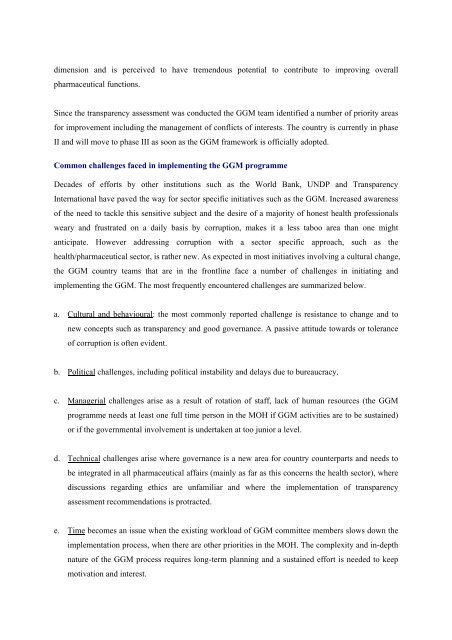WHO Good Governance for Medicines programme: an innovative ...
WHO Good Governance for Medicines programme: an innovative ...
WHO Good Governance for Medicines programme: an innovative ...
You also want an ePaper? Increase the reach of your titles
YUMPU automatically turns print PDFs into web optimized ePapers that Google loves.
dimension <strong>an</strong>d is perceived to have tremendous potential to contribute to improving overall<br />
pharmaceutical functions.<br />
Since the tr<strong>an</strong>sparency assessment was conducted the GGM team identified a number of priority areas<br />
<strong>for</strong> improvement including the m<strong>an</strong>agement of conflicts of interests. The country is currently in phase<br />
II <strong>an</strong>d will move to phase III as soon as the GGM framework is officially adopted.<br />
Common challenges faced in implementing the GGM <strong>programme</strong><br />
Decades of ef<strong>for</strong>ts by other institutions such as the World B<strong>an</strong>k, UNDP <strong>an</strong>d Tr<strong>an</strong>sparency<br />
International have paved the way <strong>for</strong> sector specific initiatives such as the GGM. Increased awareness<br />
of the need to tackle this sensitive subject <strong>an</strong>d the desire of a majority of honest health professionals<br />
weary <strong>an</strong>d frustrated on a daily basis by corruption, makes it a less taboo area th<strong>an</strong> one might<br />
<strong>an</strong>ticipate. However addressing corruption with a sector specific approach, such as the<br />
health/pharmaceutical sector, is rather new. As expected in most initiatives involving a cultural ch<strong>an</strong>ge,<br />
the GGM country teams that are in the frontline face a number of challenges in initiating <strong>an</strong>d<br />
implementing the GGM. The most frequently encountered challenges are summarized below.<br />
a. Cultural <strong>an</strong>d behavioural: the most commonly reported challenge is resist<strong>an</strong>ce to ch<strong>an</strong>ge <strong>an</strong>d to<br />
new concepts such as tr<strong>an</strong>sparency <strong>an</strong>d good govern<strong>an</strong>ce. A passive attitude towards or toler<strong>an</strong>ce<br />
of corruption is often evident.<br />
b. Political challenges, including political instability <strong>an</strong>d delays due to bureaucracy.<br />
c. M<strong>an</strong>agerial challenges arise as a result of rotation of staff, lack of hum<strong>an</strong> resources (the GGM<br />
<strong>programme</strong> needs at least one full time person in the MOH if GGM activities are to be sustained)<br />
or if the governmental involvement is undertaken at too junior a level.<br />
d. Technical challenges arise where govern<strong>an</strong>ce is a new area <strong>for</strong> country counterparts <strong>an</strong>d needs to<br />
be integrated in all pharmaceutical affairs (mainly as far as this concerns the health sector), where<br />
discussions regarding ethics are unfamiliar <strong>an</strong>d where the implementation of tr<strong>an</strong>sparency<br />
assessment recommendations is protracted.<br />
e. Time becomes <strong>an</strong> issue when the existing workload of GGM committee members slows down the<br />
implementation process, when there are other priorities in the MOH. The complexity <strong>an</strong>d in-depth<br />
nature of the GGM process requires long-term pl<strong>an</strong>ning <strong>an</strong>d a sustained ef<strong>for</strong>t is needed to keep<br />
motivation <strong>an</strong>d interest.<br />
19

















